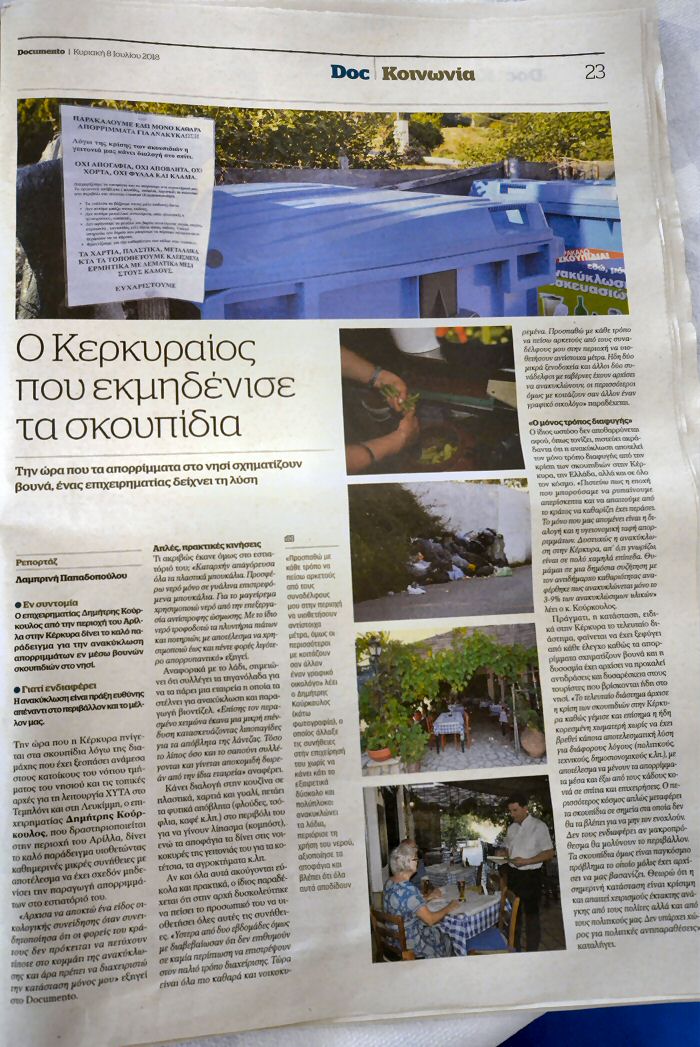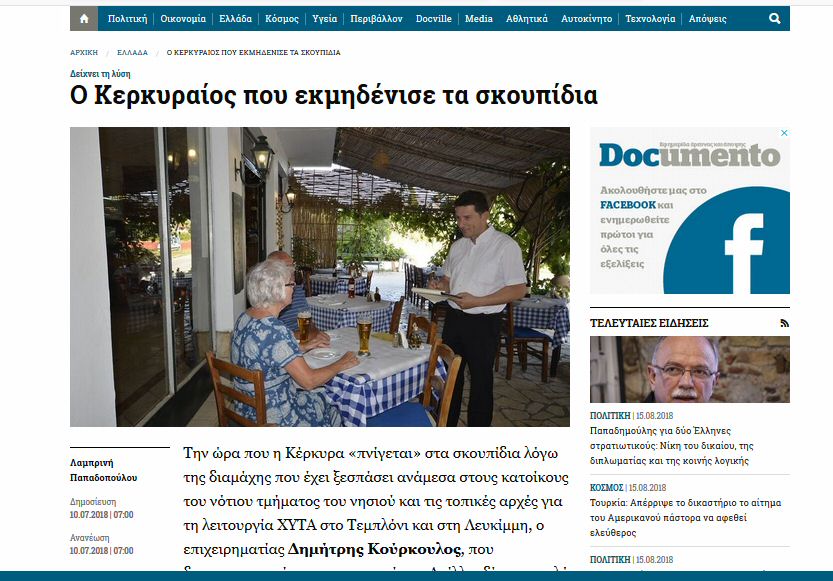An article about our Taverna on a sunday newspaper in Athens explaining what we did to help solving the problem of the rubish in Corfu.

ΤΗΕ CORFIOT WHO REDUCED GARBAGE TO ZERO
While the garbage on the island is piled up in small “mountains”, a local businessman comes up with a solution.
Story by: Lamprini Papadopoulou
In brief
The businessman Dimitris Kourkoulos, operating in the area of Arillas, Corfu, is a leading example as regards recycling of garbage waste amid huge piles of rubbish all over the island.
Why is thist of interest
Recycling is an act of responsibility towards the environment and our future.
While the island of Corfu is drowning in waste due to the conflict that has broken out between the locals in the south of the island and the local authorities as regards the operation of the landfills in Temploni and in Lefkimmi, the businessman Dimitris Kourkoulos, operating in the Arillas resort, becomes a leading example by adopting some simple daily habits; as a result, he has reduced the waste produced by his restaurant almost to zero.
“I first became somehow ecologically aware when I realized that the public authorities are not going to achieve anything in terms of recycling and therefore I have to manage the situation on my own”, he explains to Documento. Simple, practical steps
Simple, practical steps
What did he actually do in his restaurant? “First, I excluded the use of all plastic bottles. I serve water only in glass re-usable bottles. For cooking, I use water from reverse osmosis treatment. I use the same water to supply the dish and glass washer and, as a result, I use up to five times less dish soap”, he explains.
As for cooking oil, he stresses that he keeps the fryer grease for a company to collect and send it for recycling and bio-diesel production. “I also made a small investment last winter and I constructed a grease trap for the dishwasher waste. Both the grease and the soap are collected and are disposed of by the same company, free of charge”, he adds.
He separates waste into plastic, paper and glass in the kitchen; he throws bio-waste (skins and peels, shells, coffee, etc) in his garden so that it becomes a fertilizer (compost), while the leftovers are given to the neighborhood housemaids for their coops, farms, etc.
Even though all this may seem easy and simple, he admits that, when he started, he had a difficulty in persuading the staff to adopt all these habits. “Two weeks later, though, they assured me they did not wish to go back to their old way of managing things. Now, everything is cleaner and tidier. I am trying in any way I can to convince my colleagues in the area to adopt a similar method. Two small hotels and two colleagues who own tavernas have already begun recycling. However, most of the rest treat me as a weird ecologist”, he admits.
“The only way to escape”
However, he is not discouraged since, as he points out, he firmly believes that this is the only way to escape from the garbage crisis in Corfu, in Greece and in the whole world. “I believe that the time when we could litter thoughtlessly and demand that the state cleans up has gone by. The only thing we can do is waste sorting and disposing of solid waste in sanitary landfills. Unfortunately, as far as I know, recycling in Corfu is still at a very low level. I remember a public debate with the participation of the vice-Mayor responsible for the cleaning service where it was said that only 3 to 9% of the recyclable materials are actually recycled”, Mr. Kourkoulos adds.
Indeed, it seems that the situation has recently gone out of control as rubbish is piled up in small mountains and the stink is provoking reaction and discontentment among the tourists already on the island “The rubbish crisis began lately in Corfu when the landfill site was officially declared filled up while no effective solution was found for various reasons (political, technical, fiscal ,etc); as a result, the rubbish remains in or out of the waste bins close to houses and businesses. Most of the people just carry their rubbish to places which are not visible to them and therefore do not discomfort them. They do not care if, in the long-term, they pollute the environment. However, garbage is a global problem which has just begun tormenting us. I believe that the current situation is crucial and demands urgency handling by both the citizens and the politicians. There is no room for political disputes», he concludes.


